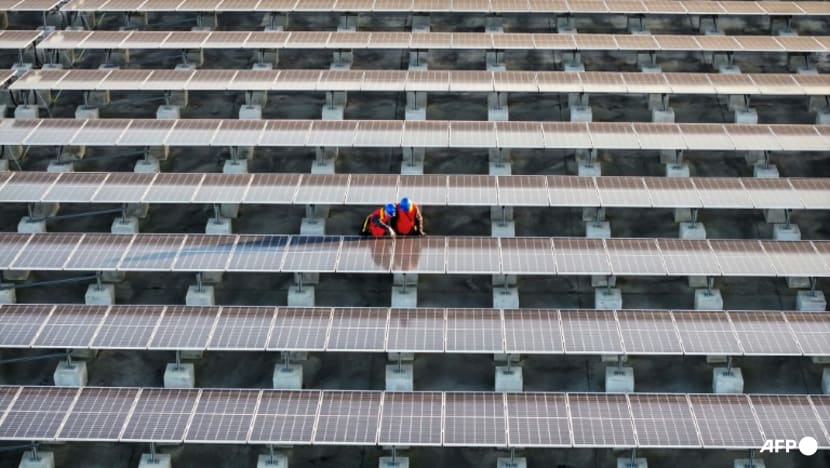New US tariffs will not lead to a full-blown trade war with China, say observers
The tariff rate on EVs is set to quadruple to 100 per cent this year, while the one for semiconductors will surge from 25 per cent to 50 per cent by next year, said the White House.

Besides EVs, the US tariff hikes also impact solar products, batteries and medical products (Photo: AFP/File/STR)

This audio is generated by an AI tool.
New tariffs imposed by the United States on China are politically motivated and are not likely to lead to an uncontrolled trade war, analysts said on Wednesday (May 15).
Following a review of tariffs imposed during a trade war between Washington and Beijing, the White House announced on Tuesday that it is hiking tariffs on US$18 billion worth of imports from China, targeting strategic sectors like electric vehicles (EVs), batteries, steel and critical minerals.
“It doesn't take three years to review tariffs imposed by a previous administration that you don't like. If you wanted to change them earlier, the Biden administration certainly could have,” Dr Derek Scissors, senior fellow at the American Enterprise Institute, told CNA’s Asia First.
The tariff rate on EVs is set to quadruple to 100 per cent this year, while the one for semiconductors will surge from 25 per cent to 50 per cent by next year, said the White House.
The action is aimed at encouraging China to "eliminate its unfair trade practices regarding technology transfer, intellectual property, and innovation", it added in a statement.
“The Biden administration is looking down the road and thinking in 2025, 2026, we could see a flood of Chinese goods in these areas and we want to get out ahead of that. But they could have done that last year. They could have done it next year. They're doing it now for the election,” said Dr Scissors, who is also chief economist of the China Beige Book. The US-based research firm tracks data on the Chinese economy.
The upcoming US presidential election in November is likely to be a face-off between President Joe Biden and former president Donald Trump.
Despite a strong response from China - its Foreign Minister Wang Yi said the move shows that some in the US may be "losing their minds" - there likely will not be a full-blown trade war, said observers.
“This latest round, it's a ramping up (of trade restrictions), but so far I think we haven't seen either side really want things to get out of control,” said Dr Chong Ja Ian, a political scientist and associate professor at the National University of Singapore.
“There's a risk, yes, and the risk may have increased. But I think (there’s) that sort of sense that the PRC (People’s Republic of China) and the US both want fairly even-keeled stabilised relations. Even if it's competitive … I think the degree of escalation won't get too far, whatever the sort of angry words that we are hearing.”
“JUST ANOTHER DAY”
“On some level, it's just another day in this US-China rivalry,” added Dr Chong, noting that there have been several rounds of tit-for-tat trade restrictions between China and the US for years.
Dr Scissors said that this time, there could be some tit-for-tat action as well, although at a smaller scale.
“I think China will look at the scope of the tariffs and say: ‘US$18 billion. You know, we'll put tariffs on US$15 billion to show that we're more reasonable than the United States, and they won't go beyond that, and the US won't retaliate against the Chinese tariffs,” he said.
He added that the only way the situation could escalate is if the US imposes tariffs on Chinese products entering the country from other countries.
The moves by Trump - who introduced levies on about US$300 billion in goods from China - and Biden share the “failing” of China escaping tariffs if it ships goods through another country, he added.
Dr Chong added that angry words between the two sides are sometimes part of negotiation tactics.
He said the trade between China and the US needs to be taken into account for perspective. In 2022, the value of goods and services trade was about US$758 billion, he noted.
“They’re (the tariffs) a big amount, in terms of the overall amount of US-PRC trade, it's not overwhelming. So let's put things in perspective,” he said.
POSSIBILITY OF TARIFFS FROM OTHER NATIONS
On whether the situation could see other countries impose tariffs on Chinese imports, the analysts said there is a chance.
The European Union has been considering raising tariffs on Chinese EVs and EV components, but when the US goes to a 100 per cent, “the EU can't go to 20 per cent”, said Dr Scissors.
“That's a waste of time. Don't do anything if you're gonna go to 20 per cent when another major trading power has gone to a 100. So you could see the EU impose pretty high tariffs, which is going to make China unhappy,” he said.
The European Commission launched an investigation last September into whether to impose punitive tariffs to protect EU producers against cheaper Chinese electric vehicle imports it says are benefiting from state subsidies.
On the other hand, EU tariffs may act as an invitation for China to invest more and produce more goods in the region.
“If that's the case, it will appear that the trade war is widening. But in fact, the EU and China already have a way to de-escalate, which just involves China investing more in the European Union,” said Dr Scissors.
China's efforts to kickstart its economy by subsidising key industries like the EV sector is leading to a lot of capacity which is being shipped overseas, noted Dr Chong.
That puts stress on the economies that are importing these goods, he said.
“For the Europeans and the US, they want to be able to make sure their nascent industries are able to get up to speed as well. So it's a pretty complex calculation on all sides,” he said.















